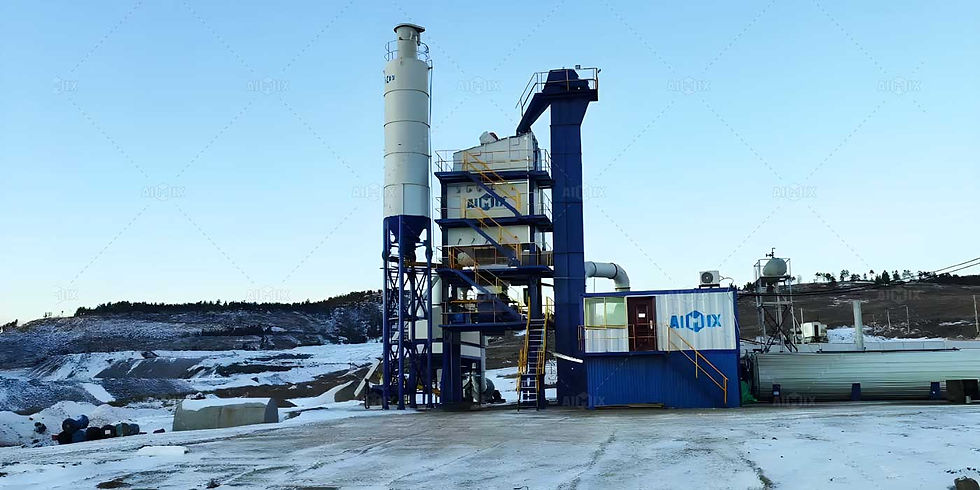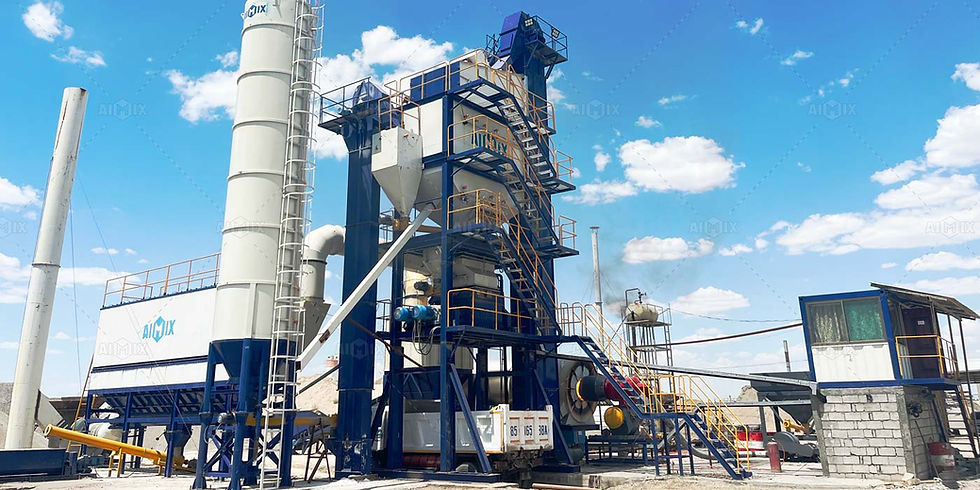Is it a Smart Investment to Buy an 80 TPH Asphalt Plant for Both Self-Use and Asphalt Selling?
- aimixglobal5
- May 29, 2025
- 3 min read
When you're involved in road construction or infrastructure development, asphalt is a constant need. The question many contractors and developers ask is—should I invest in my own asphalt mixing plant? More specifically, is it a wise decision to buy an 80 TPH (tons per hour) plant asphalt for both in-house project use and for selling hot mix to others?
This article explores that question from a practical point of view. I’ll walk you through how this decision could impact your business operations, reduce costs, and even open up a new income stream. Let’s dive in.

Why 80 TPH Is the Sweet Spot for Many Projects
Before we talk about profit, let’s look at why the 80 TPH capacity is a popular choice. It’s not too big, not too small. For medium-sized roadwork projects, parking lots, or small municipal jobs, this capacity is just right. It meets the daily asphalt demand without creating unnecessary waste or requiring excessive fuel consumption.
At the same time, it gives you enough flexibility. You can produce asphalt for your own use during the day and still have room to sell to nearby contractors in the evening or early morning. That kind of flexibility matters when you're trying to stay competitive.
Reducing Your Own Asphalt Costs
Now let’s talk about cost. Buying asphalt from third-party suppliers can be expensive, especially when fuel prices and transport costs rise. If your site is far from the plant, you also risk temperature loss during transport, which can affect paving quality.
By producing your own asphalt, you remove those problems. You control the mix quality, reduce transport costs, and eliminate delays caused by external suppliers. Over time, these savings add up—especially if you have a steady workload.

Creating an Additional Revenue Stream
But what if you don’t need to use the plant every day? That’s where the second benefit comes in. Asphalt is always in demand. Local contractors, municipalities, and private developers may not have access to reliable suppliers—especially in remote areas.
Owning a plant gives you the chance to sell hot mix directly to these customers. Even selling just 30–50% of your daily capacity could help you recover your investment faster. Plus, once word spreads that you’re a reliable source, the demand often grows naturally through referrals.
Real-World Feasibility: What You Need to Consider
Of course, it’s not just about capacity and profit. You also need to consider logistics. Do you have enough space for installation? Is your area zoned for industrial use? Do you have access to raw materials like bitumen and aggregate?
Also, think about operations. Will you run the plant yourself or hire a team? If you're new to asphalt production, it's smart to work with asphalt plant suppliers who offers training and local after-sales service. That kind of support can make your transition smoother and more successful.

How to Maximize ROI with an 80 TPH Plant
To make the most of your investment, you’ll need more than just equipment. Planning is key. Choose a location close to your target projects. Maintain your plant regularly to ensure consistent quality. And don’t forget to market your mix to potential buyers in your area.
Working with a trusted supplier can also help you get the right setup from the start. From site planning to configuration selection, every detail affects long-term performance and profitability.
When Is It the Right Time to Invest?
If you're already handling regular paving projects or planning to expand your construction services, now might be the right time. If you’re frequently buying asphalt from others and dealing with delays or quality issues, owning a plant gives you control.
Likewise, if there's growing demand for asphalt in your region, stepping in as a supplier can position you ahead of competitors. The key is to look at your workload, local demand, and your long-term business goals.

Final Thoughts: A Smart Move If Done Right
In short, investing in an 80 TPH asphalt plant makes sense for many medium-scale contractors and project developers. It cuts long-term material costs, improves supply control, and opens doors to new income from hot mix sales. As long as you plan carefully and work with the right partner, it can be a smart, scalable move.
Need Help Choosing the Right Asphalt Plant?
I work directly with clients across Indonesia to provide reliable asphalt plant solutions. From mobile drum mix asphalt plant to stationary batch plants, I help you choose the setup that fits your project size, site conditions, and business goals. We offer fast delivery, on-site support, and local service teams so your plant stays running smoothly.
Want to know more? Contact me today to explore whether an 80 TPH asphalt plant is right for your business—and how to make it a smart long-term investment.



Comments